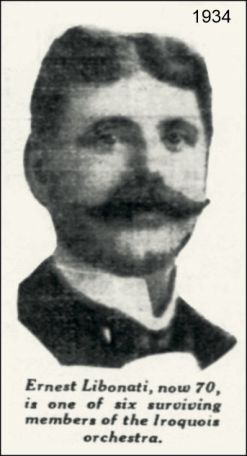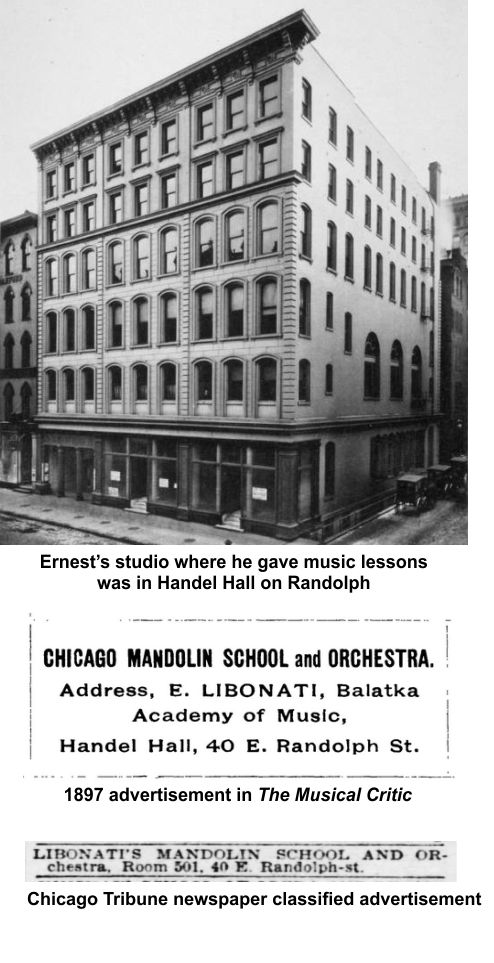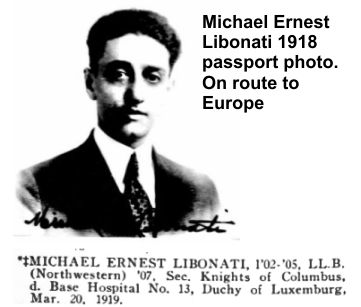|
Call Ernie
As a performer, composer, and director,
forty-three-year-old Ernest (Ernesto) M. Libonati
(1860–1935) had in 1903 been a fixture in Chicago
musician circles for over a decade. He could have
been a regular in the
Iroquois Theater orchestra or
a fill-in musician for a single performance. His
primary instruments were the violin and mandolin,
but he also played the flute and almost certainly
the cello, piano, and xylophone as well. That kind
of instrument versatility and his connection to many
other Chicago musicians, including family members,
might have put his name near the top of the list for
Chicago orchestra managers.
In an era with a live orchestra in every theater and
at many social gatherings, keeping chairs filled
would have been a challenge. The Rothschild
department store on State and Van Buren even offered
live music in its restaurant for the weekday lunch
crowd. Phonographs were popular in homes, but the
invention of amplifiers for large venues was six
years away.
For the Wednesday afternoon matinee on December 30,
1903 Ernest played the violin — alongside his
college-age son, Michael. The Iroquois orchestra's
regular cello player was absent, so
twenty-one-year-old Michael Ernest Libonati filled
in. Michael, who sometimes went by his middle name,
was a student at the University of Michigan, home
for the holiday, probably glad to earn a few extra
dollars.*
Escape
Father and son Libonati
escaped from the Iroquois without injury.
Ernest saved his violin but the cello
was left in the orchestra pit. When it caught
fire, orchestra director
Anthony Frosolono decided it was time to flee.
Upon opening the primary door from the orchestra

pit to the basement beneath the stage, they were met
with flames. They took another corridor
instead, breaking down a door to get to the costume
department and engine room, and on to stairs leading up to the back of the stage and out to the Dearborn street
exit. The basement by that time was
sufficiently smoke-filled that
some performers escaped through a coal chute and
manhole in the street. Thirty years later
Ernest described having grabbed a six-year-old
performer and pushing him up through the coal chute.
A fiddler's life
Ernest and his wife, Flora (Fiora) Pellettieri†
Libonati (1863–1953), immigrated to the United
States from south-central Italy with their parents
in 1872 as youngsters. Ernest's parents were Michael
and Rosa de Roma Libonati.
Ernest and Flora married in 1881 and by 1903 had six
children aged seven to nineteen, three sons and
three daughters: Michael, Rosamond (
biography),
Isabella, Elliodor, Ellinore (Mariassunta), and
Roland. A seventh, Luigi, died as a toddler. For
most of those years, the family lived in a flat on
an upper floor at 416 and the adjacent 420 South
Clark in Chicago.‡ Other family members shared the
address over the years, including Flora's sisters
and their families, Maria Emanuello Pellettieri
DeStefano and Josephine Pellettieri Franco.
Josephine, her husband Frank, and their sons were
also musicians.
In addition to hiring out to orchestras, Ernest gave
music lessons, in the 1890s directed his own
band/orchestra, and composed music. In 1903 his
music studio was in room 501 at the Handel Hall at
40 E. Randolph, next to Marshall Field department
store and a few blocks from the Iroquois Theater.
(Handel Hall had previously been known as the
LeMoyne Building and housed the Western News
Company.)

|

|
The instrument for which Libonati was best known was
the
mandolin.
He gave lessons on the instrument and was the
director of the Chicago Mandolin Orchestra. In 1902
appeared sheet music for three of Ernest's polka
compositions for mandolin and piano: Jewels of
Joy, Heart's Delight, and Kiss in a Letter, as
well as Echo's of the Past for mandolin and
guitar. Ernest also sat First Chair in the Bohmann
Quartett, a group of Chicago musicians sponsored by
the Bohmann company, manufacturer of mandolins and
guitars. (See accompanying advertisement.) Other
members of the quartet included Ernest's three
brothers-in-law, fellow mandolin player Charles
Pellettieri, John (Giovani) Pellettieri on flute,
and Francesco Franco on the harp. Prior to his
involvement in the Chicago Mandolin Orchestra,
Ernesto was the First Soloist of Valisi's Florentine
Orchestra and the Tomaso Orchestra. Ernest was a man
at the right time and place to cultivate the Golden
Age of the mandolin.
Ernest's survival at the Iroquois Theater helped
ensure the education and success of his children.
Four of six graduated from college — a major
accomplishment in an era when fewer than ten percent
of the population did so. Three became attorneys and
politically active, Ellidore as an outspoken
opponent of communism and fascism, Roland as an
elected official, and Michael with a run for an
assistant judgeship. One daughter married a baron
and another a doctor.
Roland represented his Illinois district in the
House of Representatives from 1957 to 1965. A
colorful character, nicknamed Libby, Roland served
in the 86th Division Infantry during World War I.
Afterward, he graduated from the University of
Michigan and Northwestern, passing the bar in 1924.
(The Libonati focus on scholarship continued when
his son, Michael E. Libonati's namesake, became a
law professor.) In a 1977 interview, Roland briefly
mentions his father's music studio.
(
Family remarks start around 6:42.)

Substitute cello player at the Iroquois, Michael E.
Libonati (1882-1919), the oldest of Ernest and
Flora's boys, graduated from the University of
Michigan and became an attorney. He started a
wholesale poultry business in Curryville, Missouri,
and experimented with politics, but in 1918, with
his two younger brothers overseas in World War I
combat, he put his legal career on hiatus.
Too old to enlist, he joined the Knights of Columbus
in France as an overseas secretary to assist
American Expeditionary Forces fighting in Europe.
Known as Caseys,
K of C volunteers operated clubhouses for soldiers,
delivered supplies, performed first aid to the
wounded, and visited them in hospitals to provide
stamps, stationery supplies, and letter-writing
help. It was in that last service where Michael may
have contracted the illness that took his life in
March 1919, four months after the end of the war.
According to a
1921 Knights of Columbus history by Joseph J. Johnson,,
Michael contracted
influenza during the worldwide 1918–1919 pandemic that killed
over one million American soldiers (about
1/3 from doc top). His funeral service was held in
France, led by Chaplain Arthur L. Girard, a Chicago
clergyman, known attendees being Chaplain John
O'Hearn and James Daly, also Chicago men, Daly a
fellow Casey. Michael's grave marker states he died
in Coblenz (Koblenz), Germany, but his college
alumni newsletter reported that he died at the
Evacuation Hospital at Wolferdange, Luxembourg,
about two hours away, of pneumonia meningitis.
Not all good memories for Ernest
At a 1934 gathering of the Iroquois Memorial
Association on the thirtieth anniversary of the
fire, Ernest spoke reflectively of his children's
success but also of life's disappointments,
including Michael's death, the only musician amongst
his children. He mentioned too that they had lost a
lot of money in the 1929 stock market crash. Ernest
was seventy years old and one of only six surviving
members of the Iroquois orchestra.
In his recollection, the fire curtain had caught on
an aerialist guide wire. It didn't; at legal
inquests, a dozen stage workers testified about
their struggle to release the fire curtain from the
strip light obstacle. From the orchestra pit, Ernest
could not have seen the obstacle or the struggle,
but it is interesting that perhaps he did not follow
disaster coverage in the newspapers. It might be
he'd had enough of the Iroquois. He never played in
the structure again.
|
|
Discrepancies and addendum
Another Libonati made it big
in Ragtime. In the early 1920s, the musician in the
family with celebrity recognition was ragtime
xylophonist Caesar Jess Libonati (1885–1965),
Ernest's younger half-brother. Jess recorded several
records and toured the country. Prior to his success
with the xylophone, he performed as a drummer in the
Buffalo Bill Wild West show. A charismatic and
colorful fellow into old age.
* Back in Ann Arbor, when school was in session,
Michael Libonati worked as a part-time waiter at Prets,
formally known as the Campus Club and
Prettyman's
Boarding House,
where he served the athletes who made it home —
Michigan Wolverine's varsity football and their
legendary coach,
Fielding Yost,
who led them to six national championships and ten
Big Ten Conference titles during his twenty-five
years coaching the team.
† Sometimes misspelled as Pelletire or Pallatira.
‡ According to a biography about daughter Rosamond,
among the ground and basement level retail
businesses below their family's flat was a bakery
owned by her uncle DeStephano and for a time a
restaurant or bar with which Ernest was owner or
manager. I failed to find anything about Ernest and
a bar or restaurant. The Rosamond biography
relegates Ernest to a near footnote: Rosa
Libonati's father was also a musician who played for
the family's parties. Eventually, he played music in
a small Italian orchestra in halls and restaurants. As
though music were Ernest's hobby, a diversion from
his restaurant business. The evidence reveals a much
different picture. From his arrival in Chicago in
1888 until his death, the only newspaper references
to the man other than his obituary were relative to
his musical career. For U.S. Census reports, he
described his occupation in 1900 as a music teacher,
in 1910 as a violin professor, and in 1920 as a
musician in a cafe. In Chicago city directories for
twenty-three years, 1888–1911, he described himself
as a musician and/or music teacher. For many years
he ran classified advertisements in the Chicago
Tribune for mandolin lessons and rented a studio in
which to conduct those lessons. Rosamond described
her mother as the ambitious disciplinarian in the
family. Perhaps Flora's ambition and Ernest's
passion were not always aligned.
|
